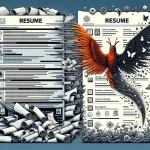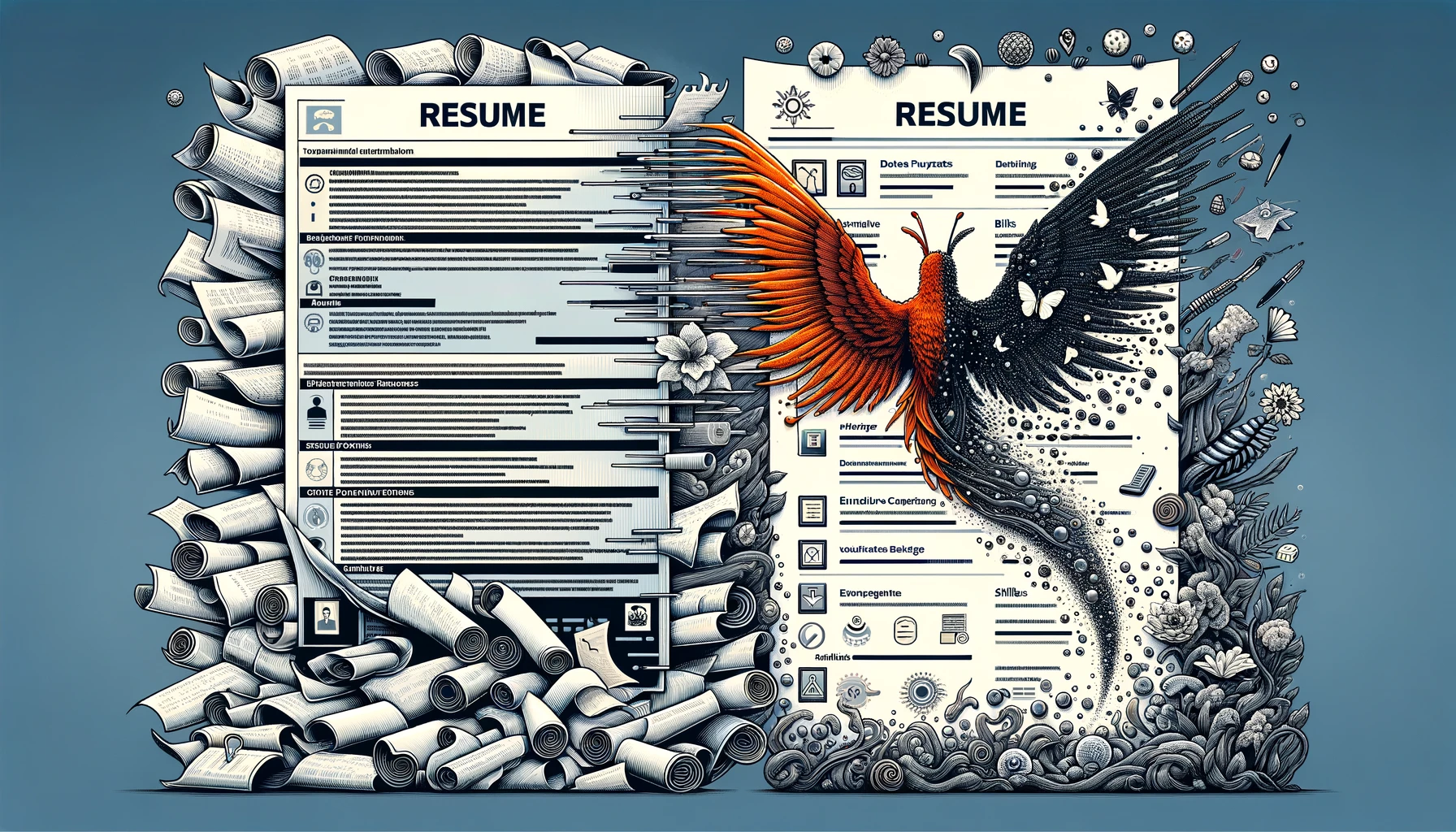In a world where job markets are increasingly competitive and first impressions can make or break career prospects, the power of a well-crafted resume cannot be overstated.
Your resume serves as your professional passport, opening doors to new opportunities and serving as a snapshot of your accomplishments, skills, and aspirations.
It is not just a mere document but rather your first handshake with potential employers, setting the tone for further interactions.
Gone are the days when resumes were simply summaries of work histories; they have evolved into dynamic marketing tools that showcase not just what you’ve done in the past but also who you are and what you can bring to the table.
A strategically structured resume has the ability to captivate hiring managers within seconds, enticing them to delve deeper into your profile and consider you for valuable interview slots.
Imagine if your resume could speak for you before you even step foot in an interview room – this is precisely why mastering the art of resume writing holds utmost significance in today’s cutthroat job landscape.
As we unravel common pitfalls that may be lurking within your current resume setup, brace yourself for insights that will transform how you perceive this crucial document.
Join us on this journey towards crafting resumes that stand out amidst stacks of applications, beckoning recruiters to take notice of your unique value proposition. Let’s dive into illuminating red flags while paving the way for interview success – because securing that dream job starts with acing the very foundation: your resume.
Common Resume Red Flags
When it comes to resumes, certain red flags can instantly turn off potential employers. Typos and grammatical errors are like glaring neon signs signaling carelessness to recruiters.
In a sea of applicants, even one small mistake can be enough reason for your resume to take a nosedive into the rejection pile.
Imagine spending hours perfecting your experience and qualifications only to sabotage your chances with overlooked typos – it’s like wearing an impeccable suit with mismatched socks.
Irrelevant information is another landmine lurking in many resumes. While you might want to showcase your diverse skills, including every random part-time job or irrelevant hobby can dilute the impact of what truly matters.
Recruiters don’t have time for decoding puzzles; they’re looking for concise, relevant information that resonates with the job requirements.
Think of your resume as a curated gallery showcasing your most impressive works – clutter it with too many pieces, and the masterpiece gets lost in the chaos.
Impact of Red Flags
When it comes to the competitive world of job applications, the presence of red flags on a resume can be detrimental to a candidate’s chances of securing that coveted interview.
These red flags act as warning signals to potential employers, signaling potential issues or shortcomings that may make them think twice about moving forward with a candidate.
Whether it’s glaring typos and grammatical errors that raise doubts about attention to detail or unexplained gaps in employment history that leave recruiters questioning reliability, each red flag has the power to overshadow an otherwise strong profile.
Moreover, these red flags not only cast doubt on a candidate’s qualifications but also reflect their level of professionalism and commitment.
A lackluster resume riddled with inconsistencies or irrelevant information can send the message that the applicant is careless or lacks focus – traits that are rarely desirable in any role.
In today’s competitive job market where first impressions matter more than ever, candidates must ensure their resumes are polished and free from any red flags that could hinder their chances of standing out among the sea of applicants vying for the same position.
By understanding the impact these red flags can have on their prospects, job seekers can take proactive steps to rectify them and increase their likelihood of scoring an interview opportunity.
Tips for Overcoming Resume Red Flags
Crafting a stellar resume requires attention to detail and a keen eye for identifying potential red flags that could sabotage your chances of landing an interview.
One key tip for overcoming resume red flags is to tailor your document to the specific job you’re applying for.
Generic resumes often fall flat, failing to capture the unique skills and experiences that make you a standout candidate.
By customizing your resume with keywords and phrases found in the job description, you demonstrate alignment with the employer’s needs, increasing your chances of making it past initial screenings.
Moreover, another crucial piece of advice is to quantify your achievements whenever possible. Numbers speak volumes on a resume, providing concrete evidence of your impact in previous roles.
Whether it’s revenue growth percentages, project completion times, or customer satisfaction scores, quantifying results showcases tangible outcomes and reinforces your credibility as a top performer.
By incorporating metrics into your accomplishments section, you not only catch recruiters’ attention but also paint a vivid picture of how you can contribute positively to their organization. Remember: show them what you’ve achieved so they can envision what you’ll accomplish in their team!
Testimonials or Expert Advice
Recruiters and career experts stress the paramount importance of steering clear of common resume red flags to secure coveted interview opportunities. Sarah Richards, a seasoned recruiter at a leading multinational corporation, underlines the impact that these missteps can have on applicants’ initial impressions.
She affirms, Resumes littered with errors or lacking in clarity send immediate signals of unprofessionalism and lack of attention to detail. Richards emphasizes the need for candidates to meticulously proofread their documents and showcase their qualifications effectively.
In line with this sentiment, John Stevens, a renowned career coach with over two decades of experience in guiding professionals towards successful job placements, highlights the role of resume content relevance. Stevens asserts, One key mistake I often see is individuals including outdated or irrelevant information on their resumes.
Not only does this clutter valuable space but it also detracts from showcasing current skills and accomplishments. His advice underscores the necessity for candidates to tailor their resumes to each specific job application by aligning experiences that directly correlate with the desired position’s requirements.
Revamp Your Resume: Elevate Your Job Application Strategy
Now that you’ve unearthed the hidden pitfalls lurking within your resume, it’s time to steer your application towards success.
Armed with a sharper awareness of red flags and a clear understanding of what recruiters seek, you possess the power to transform your resume into a compelling narrative of your professional journey.
Take this newfound knowledge as a beacon guiding you through the maze of job applications, ensuring each word on your resume shines with relevance and impact.
Sift through your resume like an eagle-eyed editor, eliminating redundancies, updating outdated information, and fine-tuning every section for maximum potency.
Let each word resonate with purpose, showing recruiters not just who you are but why you’re the perfect fit for their team. Infuse elements that highlight achievements over responsibilities and quantifiable results over generic tasks – painting a vivid picture of your capabilities in action.
With this proactive approach to revamping your resume, every line becomes a stepping stone toward securing that coveted interview invite.
As you set out to refine your application materials armed with this arsenal of insights, remember: crafting an exceptional resume is not merely about ticking boxes or following templates; it’s about showcasing the unique value proposition only you can offer.
Embrace this opportunity to differentiate yourself from the competition by crafting a document that captures attention at first glance and leaves hiring managers eager to learn more about the person behind those carefully chosen words.
It’s time to rewrite not just lines on paper but narratives that speak volumes about what sets you apart in a sea of applicants – seize this chance to redefine how potential employers perceive your professional story.





